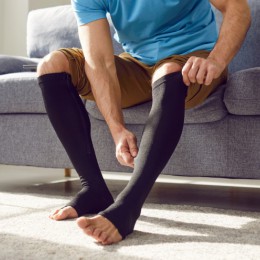![Need a Wheelchair? Follow These Easy Steps [Guide]](/uploads/blog/2e95d925301a267c942067514a325c62.jpg)
So you or a family member needs a wheelchair, what next? Do you need a prescription for a wheelchair? Can you rent a wheelchair?
Durable medical equipment (DME) is not commonly thought about until you need something for yourself or a loved one. Chances are you weren’t exactly prepared for this and may not know where to start.
Let’s get to answering some of the most common questions.

Do I need a prescription for a wheelchair?
The answer is yes and no depending on who or how it will be paid for. If you want your insurance to cover the wheelchair, you will need a prescription and likely chart notes from the visit you had when your doctor prescribed it.
If you or your doctor need a reference guide for ordering a manual wheelchair, you can find our Manual Wheelchair Detailed Written Order (DWO) on our Order Forms page. This form breaks down exactly what insurance companies like Medicare require in order to recognize it as medically necessary, and therefore cover it.

So if you are trying to get a wheelchair covered by your insurance, we recommend getting our Manual Wheelchair DWO over to your doctor. Schedule an appointment with them to go through the form, get the chart notes from the visit, and get it over to an in-network DME provider like Binson’s. We are in-network with dozens of insurance providers. Check out our list of accepted insurances for more information.
So what if you want to buy a wheelchair, do you need a prescription?
No. You do not need a doctor's prescription to purchase a wheelchair out-of-pocket. You can head over to any of our retail locations and talk with a customer service representative to get the right fit for your needs. We carry wheelchairs of all sizes to accommodate you.
Custom Comfort | Wheelchair Accessories
Every person has different needs and wheelchairs may not include everything you need out of the box. Let's go over some of the most commonly added wheelchair accessories.
Cushions
You may benefit from a seat and or back cushion for your wheelchair to help prevent decubitus ulcers, especially if you have a history of them.
Wheel Lock Extensions
Reaching the wheel locks on your own may be difficult and a safety risk if you cannot engage them fully. So your doctor may want to add wheel lock extensions to your wheelchair.
Seat Belt
For those who are at a higher risk of falling, sliding, or with decreased upper body strength, you may consider talking to your doctor about adding a seat belt. This is only there to help keep the patient safe and secure in the chair and should not be used as a restraint.
Oxygen Holder
If your patient is on oxygen and uses tanks, this attachment can be very useful. Mounted to the back of the chair, you can slide a tank in and transport your patient safely with oxygen.
Elevating Leg Rests
These leg rests are great for those who need to spread out the pressure load and help increase circulation to prevent swelling.
Anti-Tipping Device
If you are using elevating leg rests, an oxygen tank holder, or reclining back wheelchair, this anti-tipping device is strongly recommended. This as the name implies, helps prevent the wheelchair from tipping backwards.
These are just some of the basic accessories you can get for your manual wheelchair. These accessories and more are all listed out on our Manual Wheelchair DWO and can be discussed between your and your doctor.
Can I rent a wheelchair?
Yes. You can rent a wheelchair from any of our retail locations. We rent them daily or monthly (Any rental 4+ days will be charged the full month's rental fee). We require a security deposit along with the rental price up front. Stop in, we would be happy to serve you.
We hope you found what you were looking for. We would be happy to answer any other questions you may have, please feel free to contact us. If you are looking for a retail location near you, please check out our location page where you can click on “Near Me”, search by map, or filter by services offered.





Shammy Peterson | Aug 11th 2021 @ 10:31 PM
It was nice when you said that you may consider having a seat belt added if a patient is at a higher risk of falling, sliding, or with decreased upper body strength. As you said, this helps to keep the patient safe. This is something that I will consider since I am looking for a durable medical equipment shop where I can purchase a wheelchair for my diabetic father. He recently suffered from stroke, so his mobilities are restricted. My priority is his safety at all times.